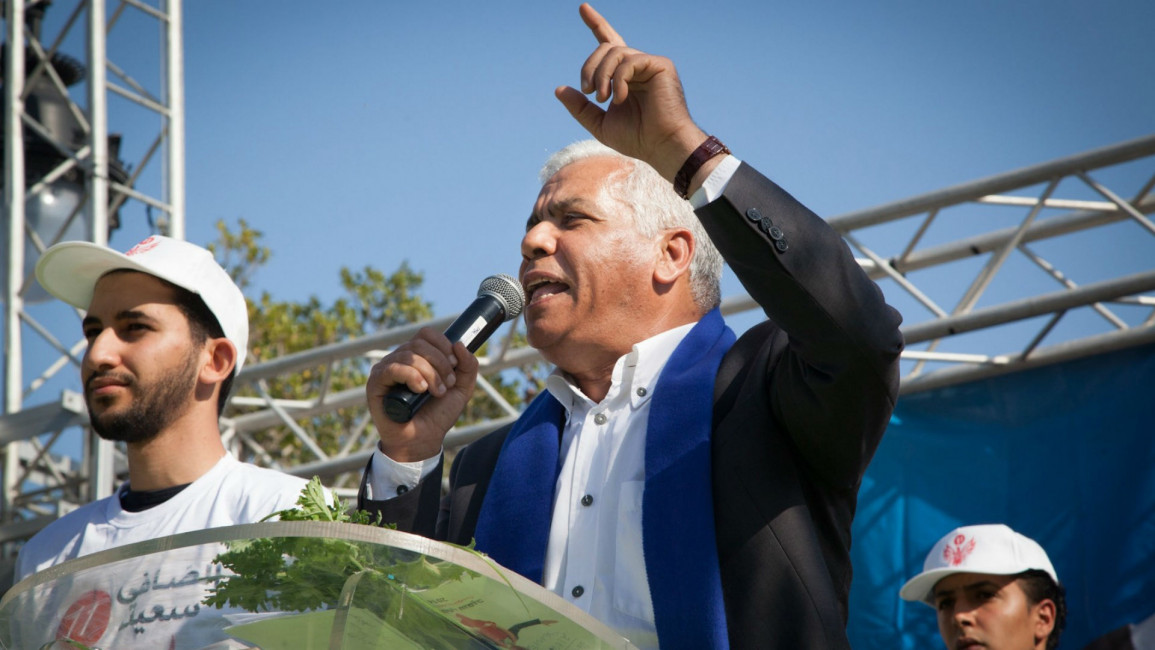
Tunisia: Encroachment or coexistence?
Tunisia's city centres are usually awash with advertisements for consumer goods. This weekend, with Tunisia’s first presidential elections taking place on Sunday, it is now portraits of presidential candidates and electioneering slogans dominating the high street.
The multitude of faces that are running for the country's top job can be perplexing for many who lived for decades under the rule of one man - Zine El Abidine Ben Ali. Following the overthrow of the dictator in 2011, Tunisians have been enjoying an historic presidential race between a multitude of candidates and vocal campaigning from supporters.
Equal coverage
Following recommendations by Tunisia's Independent High Authority of Audiovisual Communication, TV channels are obliged to give equal time slots to all presidential candidates.
But not all of the candidates possess the necessary leadership and communication skills to make for lively political debate. It might be a hangover of single-party rule, but all candidates refused to take part in confrontational TV interviews and, so far, coverage of this important historical event has been tedious.
The atmosphere of Tunisia's presidential election appears to be heavily influenced by last month's parliamentary elections, when the secular Nidaa Tounes overtook the Islamist Ennahdha Movement to become the country's leading party.
Tunisia is tense from continuous strikes and the constant threat of terrorism, which might have dampened enthusiasm for the elections.
Cryptic bargaining
It seems that this year's electoral race can be summed up by two words: "encroachment" and "password".
"Encroachment" might be Nidaa Tounes' next move if its leader, Beji Caid Essebsi, is elected president. This would put the party in control of both the government and the presidency.
| Tunisia is tense from continuous strikes and the constant threat of terrorism. |
Essebsi's competitors have used concerns about the party controlling all levers of power in their campaigns to win support from those suspicious of a power grab after decades of tyranny.
But are these concerns legitimate or overblown? Tunisian political researchers cannot agree.
Constitutional expert Rafaa Ben Achour believes that the natural balance of power in constitutional democracies is to find political harmony between different branches of power. Having a president outside the governing party, he says, will inevitably lead to disputes over powers and institutional paralysis.
Others disagree and believe that the transitional route Tunisia took after the revolution has made for a delicate but effective balance of power between Carthage, the headquarters of the presidency, and al-Kasbah, the seat of government.
Adoptions and alterations
Tunisia has borrowed the elected presidential concept. It also introduced, from other parliamentary systems, the idea of a strong government that reports directly to parliament.
The powers of the president in the Second Tunisian Republic have been greatly watered down. He is in effect only a symbol of unity for the country, to guarantee independence and continuity.
| It seems that this year’s electoral race can be summed up by two words: 'encroachment' and 'password'. |
The president can be responsible for setting general policies in the fields of defence, foreign relations, and national security, but only after consulting the head of government.
Other than that, the prime minister sets policy related to economic, social and cultural matters.
The second term to watch, "password", refers to Ennahdha's decision to allow a secret ballot in the upcoming elections.
Many suspect that the party's leadership might still try to mobilise its supporters with a last minute "password" behind one candidate.
As the Islamist party is not fielding a presidential candidate, or officially backing one, the fate of the 950,000 votes that the party obtained in the parliamentary election lies in the balance - and several presidential candidates have made election promises that will appeal to Ennahdha's supporters.
Win for democracy
Many political commentators believe that Ennahdha will set up a power-sharing deal with Nidaa Tounes, rather than support a candidate from another party or an independent.
The idea for this cross-party accord was reportedly the work of a group of young graduates within the Afek Tounes party, who have been drawing up a "national understanding" project, where the powers of the executive and legislative branches between the country's two biggest parties would be carved up between them.
The position of prime minister, meanwhile, would be given to an independent economist.
Whatever course the major parties decide to take, Tunisia has been the Arab Spring's one success story both in terms of stability and political pluralism. For the Tunisian people, the real winner in the upcoming elections will be the country's democracy, not any one candidate.
This is an edited translation from our Arabic edition.



